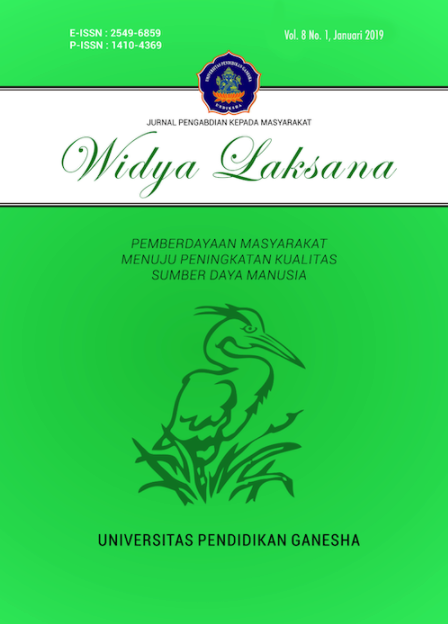PELATIHAN PENGOLAHAN MINYAK GORENG BEKAS (JELANTAH) MENJADI BIODIESEL DENGAN KATALIS ENZIM DI KOTA DENPASAR
DOI:
https://doi.org/10.23887/jwl.v12i1.38468Keywords:
minyak jelantah, biodiesel, enzimAbstract
Kegiatan ini merupakan pelaksanaan salah satu tri dharma perguruan tinggi, yakni pengabdian masyarakat. Tujuan kegiatan ini mentransfer teknik pengolahan limbah minyak goreng (minyak jelantah ) menjadi biodiesel dengan menggunakan katalis enzim. Masyarakat sasaran adalah salah satu pengolahan minyak jelantah di Kota Denpasar yaitu CV Caritas. yang berlokasi Ubung Kaja Denpasar, Dalam kegiatan ini melibatkan karyawan sebanyak 10 orang sebagai tenaga yang bekerja untuk memproduksi biodiesel . Metode pelaksanaan pengabdian masyarakat ini adalah metode PALS (participatory action learning system), yakni model pemberdayaan masyarakat dengan tahapan-tahapan kegiatan, (1) penyadaran, (2) pengkapasitasan dan (3) pendampingan. Hasil yang diperoleh dari kegiatan P2M ini adalah (1) Kegiatan telah berlangsung dengan baik, dan mitra telah mendapat pengalaman langsung dalam teknologi produksi pengolahan minyak jelantah menjadi biodiesel dengan bantuan enzim dengan kualitas yang baik, Tingkat kepuasan adalah sebesar 85%, cukup 14 % dan 1% biasa saja..
References
Anon. 2000. Adsorption. Microsoft Corporation. [Terhubung berkala] http://encarta.msn.com/fid/consice.asp?ti=01AFA000 [18 April 2012]
Robert O. Dunn. Effect of antioxidants on the oxidative stability of methyl soyate (biodiesel). Fuel Proc. Technol. 86, 1071-1085 (2005).
Nestor, U; Sorian, Jr.; Veronica, P.; Migo; Matsumura, M. Ozonized vegetable oil as pour point depressant for neat biodiesel. Fuel 85, 25-31 (2006).
Imahera, H.; Minami, E.; Saka, S. Thermodynamic study on cloud point of biodiesel with its fatty acid composition. Fuel 85, 1666-1670 (2006).
Hu, J.; Du, Z.; Li, C.; Min, E. Study on the lubricanion properties of biodiesel as fuel lubricity enchancers. Fuel 84, 1601-1606 (2005).
Dmytryshyn, S. L; Dalai, A. K; Chaudhari, S. T; Mishra, H. K; Reaney, M. J. Synthesis and characterization of vegetable oil derived esters: Evaluation for their diesel additive properties. Bioresource Technol. 92, 55-64 (2004).
Ramadhas, A. S; Jayaraj, S; Muraleedharan, C. Biodiesel production from high FFA rubber seed oil. Fuel 84, 335-340 (2004).
Ma, F; Clements, L. D; Hanna, M. A. The effect of mixing on transesterfication of beef tallow. Bioresource Technol. 69, 289-293 (1999).
Freedman, B; Pryde, E. H; Mounts, T. L. Variables affecting the yield of fatty esters from transesterified vegetable oils. J. Am. Oil chem. Soc. 61, 1638-1643 (1984).
Kalam, M. A; Masjuki, H. H. Biodiesel from palm oil-an analysis of its properties and potential. Biomass & Bioenergy 23, 471-479 (2002).
Zullaikah, S.; Lai, C-C.; Vali, S. R.; Ju, Y-H. A two-step acid catalyzed process for the production of biodiesel from rice bran oil. Bioresource Technol. 96, 1889-1896 (2005).
Zheng, S; Kates, M; Mclean, D. D. Acid catalyzed production of biodiesel from waste frying oil. Biomass & Bioenergy 30, 267-272 (2006).
Anonim. 2011. Keunggulan Biodiesel. [Online]. Tersedia; file:///C:/Users/User/Downloads/bidisel minyak % 20 jelantah/ Keunggulan %20Biodiesel.htm (21 Februari 2012)
Ihsan. 2011. Potensi Minyak Jelantah Sebagai Bahan Baku Biodiesel. [online]. Tersedia : http://chemistryismyworld.blogspot.com/2011/09/potensi-minyak-jelantah-sebagai-bahan.html (21 Februari 2012).
Maskun. 2011. Manfaat Minyak Jelantah. [Online]. Tersedia: http://www.infoterpanas.com/2011/11/inilah-manfaat-minyak-jelantah.html (21 Februari 2012)
Nurrohman. 2011. Pengantar Teknologi Pertanian. [Online]. Tersedia: http://nurrohman29.blogspot.com/2011/04/pengantar-teknologi-pertanian-traktor.html (21 Februari 2012).
Sumarsih. 2008. Proses Pembuatan Biodiesel Minyak Jelantah. [Online]. Tersedia: http://sumarsih07.files.wordpress.com/2008/07/proses-pembuatan-biodiesel-minyak-jelantah.pdf (20 Februari 2012)
Darmanto, S., Ireng, S.A., 2006, Analisa and Pr oduct i on, Fuel Pr ocessi ng Biodiesel Minyak Kelapa sebagai Bahan Bakar Alternatif Minyak Diesel, Traksi 4(2):6
Downloads
Published
Issue
Section
License
Authors who publish with the Widya Laksana agree to the following terms:- Authors retain copyright and grant the journal the right of first publication with the work simultaneously licensed under a Creative Commons Attribution License (CC BY-SA 4.0) that allows others to share the work with an acknowledgment of the work's authorship and initial publication in this journal
- Authors are able to enter into separate, additional contractual arrangements for the non-exclusive distribution of the journal's published version of the work (e.g., post it to an institutional repository or publish it in a book), with an acknowledgment of its initial publication in this journal.
- Authors are permitted and encouraged to post their work online (e.g., in institutional repositories or on their website) prior to and during the submission process, as it can lead to productive exchanges, as well as earlier and greater citation of published work. (See The Effect of Open Access)



